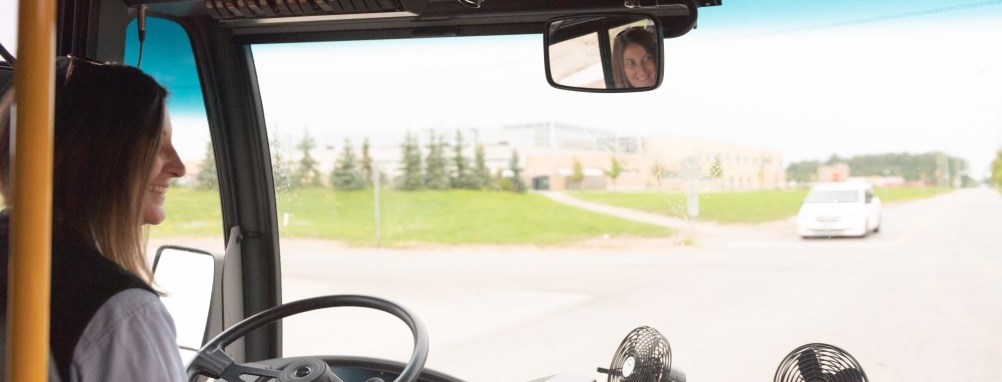Milton Transit operators are responsible for the safe operation of buses and administering our service policies that promote a safe and comfortable ride for all passengers.
Accessibility policies
We are committed to providing accessible transit service. Review the policies we have made to make Milton Transit more accessible.
Priority and courtesy seating policy |
|
Milton Transit has established designated priority seating areas for use by passengers with disabilities. This is in compliance with Section 49 of the Integrated Accessibility Standards Regulation. Courtesy Seating areas have also been allocated for use by those who may benefit from having a seat near the front of the bus. This includes, but is not limited to:
|
Service animals and pets policy |
| Guide dogs and service animals are permitted onboard Milton Transit. When it is not apparent that an animal is a service animal, you must present a letter from a physician or nurse confirming your need for a service animal. All other animals may be carried onboard as long as they are secured in a pet carrier that can fit between the seats and does not occupy the aisle. Exotic pets are prohibited. |
Milton Transit security camera program
Milton Transit is committed to providing a safe and secure transit service. In support of this commitment, Milton Transit will be initiating a security camera program on all transit buses starting on Nov. 15, 2021.
The purpose of the security camera program is to:
- Ensure the safety and security of passengers, pedestrians, operators, employees and Town property
- Investigate personal injury and claims
- Investigate and proactively resolve operational matters that could lead to a safety and security concern, or personal injury
The security camera program is guided by a policy that governs how the system is used in accordance with the privacy provisions of the Municipal Freedom of Information and Protection of Privacy Act (MFIPPA). Personal information is collected under the Municipal Act, for the purpose of detecting, deterring and investigating unlawful and safety/security activities, investigating personal injury and other legal claims and proceedings, and investigating and resolving operational matters.
Monitoring |
|
The Town does not monitor the security camera system in real-time. Video and audio surveillance recordings are only reviewed if necessary, for the purpose of detecting, deterring and investigating unlawful and safety/security activities, investigating personal injury and other legal claims and proceedings, and investigating and resolving operational matters. |
Notifications |
|
Signs are posted on the exterior and interior of buses to advise occupants that activities are under video surveillance, including audio recording. |
Access and records |
| Only designated personnel can access and release surveillance recordings from the security camera system. Non-accessed recorded information is electronically erased and disposed of after 15 days. Surveillance records used for labour relations activities, legal claims or proceedings, criminal, safety or security investigations from a law enforcement agency, including evidentiary purposes, are retained in accordance with Town’s Record Retention By-law (three years from the date the record was used). Recordings specific to investigations of operational matters are retained for 30 days. |
Passenger etiquette
As a Milton Transit passenger, you are required to be respectful of other passengers to ensure that all passengers share a positive experience on Milton Transit.
Etiquette guidelines |
|
The following guidelines are in place for Milton Transit passengers:
|
Smoking and alcohol
Smoking and the consumption of alcohol is strictly prohibited on all Milton Transit buses, inside bus shelters and at transit terminals (i.e. the Milton GO Station).
Transporting items
The following policies relate to transporting personal items on Milton Transit.
Personal belongings |
| You are responsible for your own personal belongings. Firearms, prohibited weapons, toxic and combustible/explosive materials, such as wet-cell batteries, propane tanks and gasoline containers, are not permitted onboard. |
Bulk items |
| Transporting bulk items, such as parcels and sporting equipment, is permitted as long as it is safe to do so. This decision is made by the operator. Bulk items brought onboard must be in your possession at all times, in a position where the items do not obstruct the aisle or compromise the safety of other passengers. |
Strollers and personal shopping carts |
| Strollers and personal shopping carts are permitted onboard. You may board a bus without folding up strollers or personal shopping carts, but it is your responsibility to ensure it does not interfere with the safety or comfort of other passengers. Oversized strollers (e.g. jogging strollers) are not permitted onboard. |
E-Bikes and E-Scooters |
| E-bikes and E-scooters are not permitted onboard Milton Transit buses or on bike racks. |
Lost and found |
| Milton Transit is not responsible for any lost or misplaced articles. If you have lost a personal item while travelling on any Milton Transit service, please contact us by email or give us a call from Monday to Friday between 8:30 a.m. to 4:30 p.m. Be prepared to describe your item and to provide details of your trip (e.g. route number, time, direction of travel, etc.). Unclaimed items are kept for 60 days. |
Contact Us



